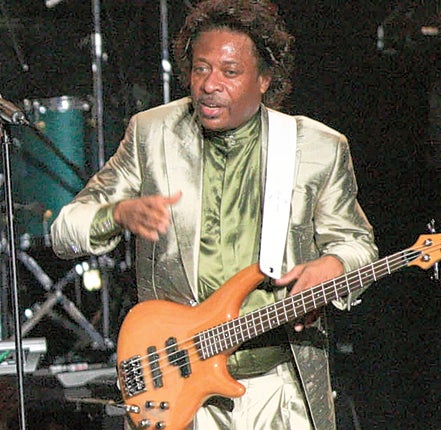Robert Wilson: Influential bassist with 1980s funk group The Gap Band

In the mid-1970s the bass guitar became a pivotal instrument in the funk and electro-funk genres. While not as flamboyant or flashy a player as Larry Graham, "Bootsy" Collins or Rick James, Robert Wilson was an influential musician whose distinctive bass lines helped The Gap Band, the group formed by his older brothers Ronnie and Charlie, make some of the most infectious party anthems of the '80s.
Starting with the irresistible "Oops Up Side Your Head", a UK Top Ten hit in 1980, and ending with "All Of My Love", the last of four US R&B chart-toppers, in 1989, The Gap Band were worthy runners-up to Kool & The Gang during that decade. Several of their hits, like "Humpin", "You Dropped A Bomb On Me" and "Outstanding", were built around Robert Wilson's electric bass and the synth-bass parts played by lead vocalist Charlie, the middle brother.
"I go for a sound that's warm but still has enough guts to cut through," Robert explained last year. "I put my parts down and Charlie comes behind me. Whatever the lick, he doubles it. He'll cut some breaks here and there, but his parts basically follow mine." Indeed, The Gap Band's groundbreaking, bass-heavy records have been sampled by Snoop Dogg, Ice Cube, The Notorious B.I.G. and Teddy Riley with Blackstreet, whose mid-'90s hit "U Blow My Mind" was a virtual rewrite of "Outstanding".
Born in Tulsa, Oklahoma, Robert Wilson first sang alongside his brothers and his sister Loretta in the choir at the Pentecostal church where their father was a minister. According to family legend, he was 14 when he joined the group formed by Ronnie (trumpet, keyboards) and Charlie after their original bass-player left in 1971. Originally called the Greenwood, Archer and Pine Street Band, after the three main streets running through Tulsa's black neighbourhood, they shortened their name to The Gap Band so it could fit on posters. Another Oklahoman, the singer-songwriter Leon Russell, discovered them in 1973.
"Leon heard us one night and snatched up the whole band," Robert recalled. "He basically removed his band and installed us. Leon came to our house and promised my mother he'd get me a tutor. He wanted me on the road, he knew we'd be a big thing."
In 1974, The Gap Band backed Russell on his Stop All That Jazz album and issued the Magician's Holiday album on his Shelter label. Three years later Robert was head-hunted by Billy Preston for a short tour: "The next day, I was onstage in Philadelphia, sharing the bill with Larry Graham, the Whispers and Blue Magic."
But his main focus remained The Gap Band, who had moved to Los Angeles and become a 12-piece. In 1978, nightclub owner Lonnie Simmons signed them to Total Experience, his studio and management company, and trimmed the line-up to the core Wilson trio with the intention of turning them into an R&B version of the Bee Gees. Simmons assumed production duties, starting with the group's eponymous debut for Mercury, and with the Wilson brothers co-wrote "Oops", their international breakthrough hit in 1979. The Gap Band also topped the US R&B charts with "Burn Rubber (Why You Wanna Make Me)" in 1981, "Early In The Morning" in 1982 and "Outstanding" in 1983. When they appeared on Top Of The Pops in 1986 to promote "Big Fun", the biggest of their dozen British hits, they wore white stetsons, a variation on the cowboy chic Simmons had suggested a few years earlier.
In 1988, with former Motown producer Norman Whitfield, they recorded the title theme for I'm Gonna Git You Sucka, the blaxploitation homage directed by and starring Keenen Ivory Wayans. The band was less active in the 1990s, partly because Ronnie followed in his father's footsteps and became a minister. Their 1999 album YK: Funkin' Till 2000 Comz featured collaborations with DJ Quik and Snoop Dogg, who has also guested on the last three solo albums released by Charlie. Last year, Robert signed a solo deal with Lucky 7 Records, the label set up by his nephew Frank Wilson.
"I don't like players whose main goal is to show that they're technical wizards," stressed Robert, whose playing style influenced Marcus Miller and Victor Wooten of Bela Fleck and the Flecktones. "Bass is all about creating a mood," Like his brother Ronnie he often turned to God for inspiration. "I connect with the spirit and let it take over."
"My brother Robert was a bad boy on the bass," Charlie said. "We shared a bond as brothers, musicians and friends. I loved him and losing him is difficult for both Ronnie and I."
Pierre Perrone
Robert Wilson, bassist and songwriter: born Tulsa, Oklahoma 21 December 1956; married (two daughters, one son); died Palmdale, California 15 August 2010.
Join our commenting forum
Join thought-provoking conversations, follow other Independent readers and see their replies
Comments
Bookmark popover
Removed from bookmarks